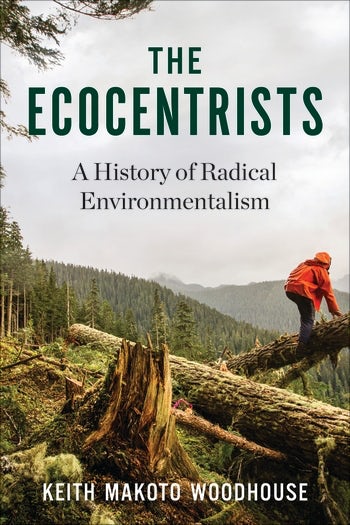Welcome back to the latest edition of the Spotlight/Insight S-USIH Book Prize series. Today we’re featuring Keith Woodhouse, who won the 2019 S-USIH book prize for The Ecocentrists: A History of Radical Environmentalism. Dr. Woodhouse is currently an associate professor of history at Northwestern University. The last two entries on the Spotlight/Insight series featured Eran Zelnik and Eli Cook.
What are you working on now?
Keith Woodhouse: My next project is about about a place called the California Desert Conservation Area, 25 million acres of Southern California stretching from Los Angeles County to Arizona and from the Owens Valley to Mexico. Much of the CDCA is overseen by the Bureau of Land Management, which attempts to balance a complicated set of  communities, interests, and imperatives under a single management plan. That plan is constantly amended, triggering a steady stream of environmental impact statements (EISs). So the project is in some ways an examination of the National Environmental Policy Act—a law that has come under attack in recent months—and its provision that all major federal projects and policies require an EIS. The project will look at what we mean by the term “environmental impact” and how that meaning is shaped by context.
communities, interests, and imperatives under a single management plan. That plan is constantly amended, triggering a steady stream of environmental impact statements (EISs). So the project is in some ways an examination of the National Environmental Policy Act—a law that has come under attack in recent months—and its provision that all major federal projects and policies require an EIS. The project will look at what we mean by the term “environmental impact” and how that meaning is shaped by context.
 communities, interests, and imperatives under a single management plan. That plan is constantly amended, triggering a steady stream of environmental impact statements (EISs). So the project is in some ways an examination of the National Environmental Policy Act—a law that has come under attack in recent months—and its provision that all major federal projects and policies require an EIS. The project will look at what we mean by the term “environmental impact” and how that meaning is shaped by context.
communities, interests, and imperatives under a single management plan. That plan is constantly amended, triggering a steady stream of environmental impact statements (EISs). So the project is in some ways an examination of the National Environmental Policy Act—a law that has come under attack in recent months—and its provision that all major federal projects and policies require an EIS. The project will look at what we mean by the term “environmental impact” and how that meaning is shaped by context.Within our field of intellectual history, what topics or approaches are you excited about?
Keith Woodhouse: I’m excited about all sort of trends within the field, but I’ll point to two in particular. First, how intellectual history and political history have really enriched each other and how historians have been drawing connections between big ideas and the minutiae of policymaking and administration, expanding our sense of what “intellectual” work can be and showing just how immediately consequential it is. Second, how intellectual historians have taken seriously the ideas of groups too easily dismissed as somehow nonintellectual. Molly Worthen’s Apostles of Reason remains for me a shining example of this sort of curiosity and the fascinating places to which it can lead.
This year, our annual meeting theme is “Revolution and Reform.” Can you reflect on how
 those ideas connect to your scholarship?
those ideas connect to your scholarship?
Keith Woodhouse: My first book project was about radical environmental activists who wanted to rebuild the world from the ground up; my second project is about the administrative state and relationships between bureaucrats and interest groups. It’s all ideas and politics!

One Thought on this Post
S-USIH Comment Policy
We ask that those who participate in the discussions generated in the Comments section do so with the same decorum as they would in any other academic setting or context. Since the USIH bloggers write under our real names, we would prefer that our commenters also identify themselves by their real name. As our primary goal is to stimulate and engage in fruitful and productive discussion, ad hominem attacks (personal or professional), unnecessary insults, and/or mean-spiritedness have no place in the USIH Blog’s Comments section. Therefore, we reserve the right to remove any comments that contain any of the above and/or are not intended to further the discussion of the topic of the post. We welcome suggestions for corrections to any of our posts. As the official blog of the Society of US Intellectual History, we hope to foster a diverse community of scholars and readers who engage with one another in discussions of US intellectual history, broadly understood.
Great seeing your name here again at the blog, Keith!
I know you mention desert in relation to this area, but does the CDCA host any grazing? Of course I’m thinking about the Bundys and like-minded citizens of the Southwest.
On your answer to the second question, I think that my work on intellectual history over the past twelve years has both enriched my understanding of the American political landscape, past and present, and also radicalized me (probably in directions I was already headed). I concur also on the trend you note in the field toward highlighting groups previously deemed “non-intellectual,” or irrational or as pseudo-intellectual. Those are the green fields of our future, not so much high intellectuals or philosophers (though both are still valuable for mining).
Hopefully I’ll see you in Boston this fall! – TL